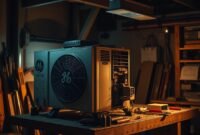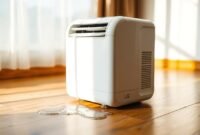Is your air conditioner making a high-pitched whistle? This noise can be more than annoying. It’s often a sign of problems with your air conditioning system. When something blocks airflow, your AC works harder and less well.
Many homeowners face this issue. The whistling is your AC’s way of saying it needs help. It could be a dirty filter or a bigger mechanical issue. Knowing the cause can prevent costly repairs and bring peace back to your home.
In this guide, we’ll explore why your air conditioner might be whistling. We’ll help you find and fix these sound problems fast and well.
Understanding Air Conditioner Whistling Noise and Its Impact
When your air conditioner starts making a high pitched whistling sound, it’s a sign to listen. These noises are not just annoying. They warn of possible problems with your HVAC system.
Air conditioning systems use sounds to communicate. A high pitched whistling usually means there’s an airflow issue. Your return vents and supply vents are key to good air flow. Any problem here can cause these sounds.
Why Whistling Sounds Indicate Problems
Whistling noises often point to specific issues:
- Restricted airflow in return vents
- Blocked or damaged supply vents
- Pressure imbalances within the ductwork
- Potential leaks or gaps in the air distribution system
How Whistling Affects System Performance
When your air conditioner whistles, it’s working too hard. It tries to push air through tight spots. This can make it use more energy and might damage it over time.
The Role of Air Pressure and Velocity
Understanding the science behind these sounds shows air pressure and velocity are important. When air tries to go through narrow spots, it creates turbulence. This results in the whistling noise you hear.
Spotting these warning signs early can stop bigger HVAC problems. It keeps your system running well.
Read also: Why Air Conditioner Keeps Running When Turned Off?
Common Causes of Low Return Airflow
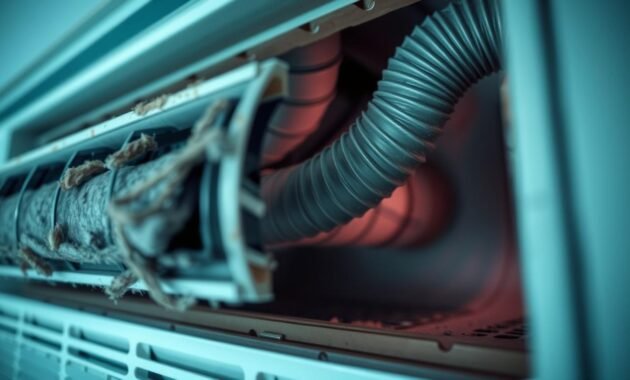
When your air conditioning system starts whistling, low return airflow might be the cause. I’ve seen many HVAC problems come from blocked air movement in homes. Knowing these common causes helps you fix issues before they get worse.
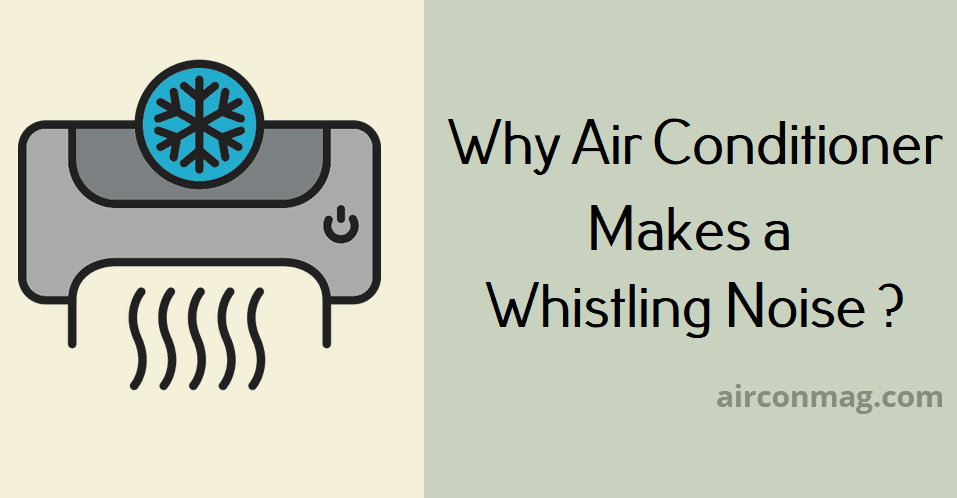
Several key factors contribute to reduced airflow in your HVAC system:
- Dirty air filters blocking essential air circulation
- Obstructed air vents covered by furniture or decor
- Closed dampers restricting air movement
- Multiple closed interior doors limiting ventilation
Dirty air filters are a big problem. They catch dust, debris, and allergens but get clogged. This makes it hard for air to flow, like trying to breathe through a thick cloth.
Air vents are key to your system’s performance. If they’re blocked by rugs, curtains, or furniture, it messes with air flow. I suggest checking and clearing all vents often to keep air flowing well.
By knowing these common causes, you can keep your HVAC system running smoothly. This helps avoid those annoying whistling sounds.
How Dirty Air Filters Lead to Whistling Sounds
Your air conditioning system needs clean air filters to work well. A dirty filter can cause problems like whistling sounds. These sounds can make your home less comfortable.
Think of your air filter as your HVAC system’s lungs. When they’re blocked, your system has trouble breathing. This makes the system work harder, leading to whistling sounds.
Read also: Why Split Air Conditioner Makes Loud Noise
Signs of a Clogged Air Filter
- Unusual whistling or high-pitched sounds
- Reduced airflow from vents
- Increased dust around air registers
- Higher energy bills
- Visible dirt and debris on the filter surface
Proper Filter Maintenance Schedule
I suggest checking your air filter every month. Replace it every 90 days. In summer, you might need to change it more often to avoid system problems.
| Filter Type | Replacement Frequency | Cost Impact |
|---|---|---|
| Standard Fiberglass | Every 30 days | Low |
| Pleated Filters | Every 90 days | Medium |
| High-Efficiency Filters | Every 6-12 months | High |
Impact on System Efficiency
Ignoring your air filter can cause more than just noise. It can make your system less efficient. A clogged filter can raise your energy bills by 5-15%.
Regular maintenance helps avoid breakdowns and expensive fixes. It keeps your system running smoothly.
Blocked Return and Supply Vents: Essential Solutions
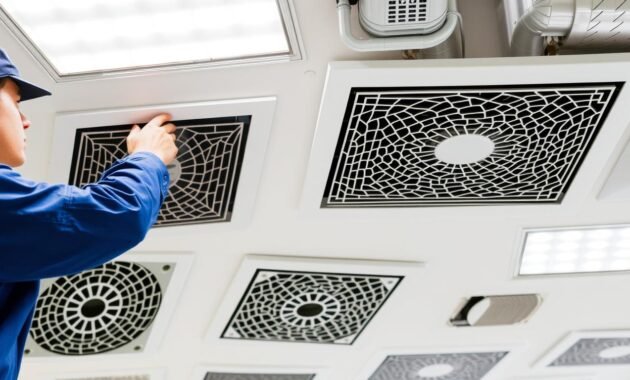
Return vents and supply vents are key to a good HVAC system. They help keep the air flowing right. But, many people unknowingly block these vents, hurting their air conditioning.
Let’s look at some easy ways to fix blocked vents and boost air flow in your home:
- Check return vents for furniture, curtains, or rugs blocking airflow
- Ensure all supply vents are completely unobstructed
- Remove decorative items sitting directly in front of vent openings
- Clean vent grills regularly to prevent dust buildup
Many don’t know how important it is to place vents right. A piece of furniture in front of a return vent can cut your system’s efficiency by 25%. This leads to higher energy costs and can wear out your AC faster.
To get the most from your system, check each room’s vents. Look for anything blocking air flow, big or small. Clearing the way for air will make your HVAC system work better.
Pro tip: Make sure there’s at least 6 inches of space around both return and supply vents. This ensures air moves well through your home.
The Connection Between Closed Dampers and Whistling
Dampers are metal parts that are key to your HVAC system’s work. They control airflow in your ductwork, which can lead to that annoying whistling sound.
Many homeowners face the problem of whistling sounds. Often, the cause is in their ductwork. Metal dampers can cause air pressure changes if they’re not set right.
Understanding Damper Positioning
It’s important to have dampers in the right spot for smooth airflow. An HVAC expert can check if dampers are causing the noise. Here are some things to look out for:
- Check damper lever positions near your inside unit
- Ensure dampers align correctly with ductwork
- Look for signs of misalignment or stuck dampers
Seasonal Damper Adjustments
Dampers need to be adjusted with the seasons. Your home’s comfort depends on the right damper settings all year.
| Season | Damper Adjustment Recommendation |
|---|---|
| Summer | Open dampers for maximum cool air circulation |
| Winter | Adjust dampers to direct heat to primary living spaces |
| Spring/Fall | Balanced airflow settings for moderate temperatures |
Professional Damper Maintenance
Some damper tweaks are easy to do yourself, but complex problems need a pro. If you’re hearing whistling or have airflow issues, call an expert.
Knowing how dampers work can help avoid noise and make your home more comfortable. Regular checks and maintenance by a pro will keep your HVAC system in top shape.
How Door Positions Affect Your HVAC System
Your home’s door positions can greatly affect your air conditioning system’s performance. If too many doors are closed, your HVAC system has trouble keeping the air flowing right. This can lead to whistling noises.
It’s important to understand how doors and air circulation are connected. Closed doors cause pressure imbalances. This makes your blower work harder. This extra effort can lead to:
- Increased system stress
- Reduced cooling efficiency
- Potential whistling sounds
To get the best out of your system, keep interior doors a bit open. This lets air move freely between rooms, avoiding pressure buildup. When doors are in the right spots, your HVAC can circulate air better.
If you’re hearing whistling sounds even after adjusting the doors, it’s time to call an HVAC expert. A skilled technician can find the problem and make sure your system works well.
Remember, good airflow is essential for a comfortable and efficient home. Watch how your doors affect your cooling system’s performance.
Professional Issues Requiring HVAC Expertise
Some air conditioning problems are too hard for DIY fixes. They need a trained hvac professional. Knowing when to call an expert can prevent costly repairs and damage.
Some technical challenges need special knowledge and tools. Only professionals have these. I’ll explain the most important issues that require expert help.
Refrigerant Leak Detection
Refrigerant leaks are serious and can harm your cooling system. An hvac professional uses special tools to:
- Find hidden leaks
- Check refrigerant levels
- Fix and recharge the system safely
Ductwork Problems
Damaged or bad ductwork wastes energy and lowers system efficiency. Professional technicians can:
- Do detailed duct inspections
- Seal leaks with the right materials
- Suggest the best ductwork changes
Blower Motor Issues
A bad blower motor can cause big problems in your HVAC system. Signs include odd noises, less airflow, and uneven cooling. An experienced technician can:
- Check electrical connections
- Look at motor bearings and oil
- Replace parts if needed
For complex HVAC issues, trust a certified professional. They offer accurate diagnosis and reliable fixes.
When to Schedule Professional Maintenance
Knowing when to call an HVAC professional can save you from expensive repairs. Some air conditioner problems can be fixed on your own. But, some signs mean you need a pro’s help.
Here are key indicators that you should contact an HVAC professional:
- Persistent whistling sounds continue after checking filters and vents
- Unusual noises accompanied by reduced cooling performance
- Visible refrigerant leaks or ice formation on system components
- Electrical issues or frequent system cycling
- Unexplained increases in energy bills
Professional maintenance is more than just fixing problems. It’s about stopping them before they start. An HVAC expert can do detailed checks that go beyond simple fixes. They’ll look at internal parts, check refrigerant, and make sure your system works well.
Regular maintenance means a full check of your HVAC system. Technicians can spot problems early, avoiding big repairs. Most say you should get maintenance done at least once a year, before the hot or cold seasons start.
Don’t wait until your air conditioner stops working. If you’re unsure about its performance, get an HVAC expert’s advice. They can help and prevent serious damage.
Conclusion
We’ve talked about how to find and fix air conditioner whistling noise. Knowing what these sounds mean can save you money and keep your HVAC system working well. It’s important to catch problems early and act fast.
Air conditioner whistling noise is more than just a nuisance. It’s a sign that your system needs some care. Issues like dirty air filters, blocked vents, and ductwork problems can cause these sounds. Homeowners can fix these issues by keeping up with maintenance, checking things out regularly, and knowing when to call a pro.
I always suggest being proactive with your HVAC system. Make sure to change your air filters every month, keep vents clear, and get your HVAC checked by a pro once a year. This way, you can avoid most whistling noise problems and keep your AC cool all summer.
Also, remember that a well-kept air conditioning system is not only quiet but also saves you money and lasts longer. Don’t overlook those whistling sounds. They’re your AC’s way of telling you it needs some help.

